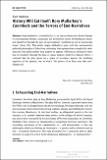Files in this item
History will eat itself: Rory Mullarkey's "Cannibals" and the terrors of end-narratives
Item metadata
| dc.contributor.author | Haddow, Sam | |
| dc.date.accessioned | 2016-05-25T12:30:02Z | |
| dc.date.available | 2016-05-25T12:30:02Z | |
| dc.date.issued | 2014-12-05 | |
| dc.identifier | 216435221 | |
| dc.identifier | 62276c34-e253-43b5-8fc6-17704b14a9cd | |
| dc.identifier | 85062284031 | |
| dc.identifier.citation | Haddow , S 2014 , ' History will eat itself: Rory Mullarkey's "Cannibals" and the terrors of end-narratives ' , Journal of Contemporary Drama in English , vol. 2 , no. 2 , pp. 275-288 . https://doi.org/10.1515/jcde-2014-0025 | en |
| dc.identifier.issn | 2288-4300 | |
| dc.identifier.uri | https://hdl.handle.net/10023/8866 | |
| dc.description.abstract | Rory Mullarkey’s Cannibals (2013), an odyssey from post-Soviet Ukraine to contemporary Britain, catalogues the destructive power of teleological historical narratives through the eyes of a protagonist “mutilated in acts of spectacular terror” (Gray 205). This article aligns Mullarkey’s play with the anti-narrative political philosophy of John Gray, criticizing their approaches as implicitly valorising the very philosophies they purport to oppose. Offering an alternative reading of Cannibals through the lens of Alain Badiou’s Rebirth of History (2012), I contend that the play opens up a space of resistance against the totalizing impulses of the present, one in which “the power of an Idea may take root” (Badiou 15). | |
| dc.format.extent | 13 | |
| dc.format.extent | 331604 | |
| dc.language.iso | eng | |
| dc.relation.ispartof | Journal of Contemporary Drama in English | en |
| dc.subject | Rory Mullarkey | en |
| dc.subject | John Gray | en |
| dc.subject | Alain Badiou | en |
| dc.subject | Cannibals | en |
| dc.subject | Eschatology | en |
| dc.subject | PN2000 Dramatic representation. The Theater | en |
| dc.subject.lcc | PN2000 | en |
| dc.title | History will eat itself: Rory Mullarkey's "Cannibals" and the terrors of end-narratives | en |
| dc.type | Journal article | en |
| dc.contributor.institution | University of St Andrews. School of English | en |
| dc.identifier.doi | 10.1515/jcde-2014-0025 | |
| dc.description.status | Peer reviewed | en |
This item appears in the following Collection(s)
Items in the St Andrews Research Repository are protected by copyright, with all rights reserved, unless otherwise indicated.

